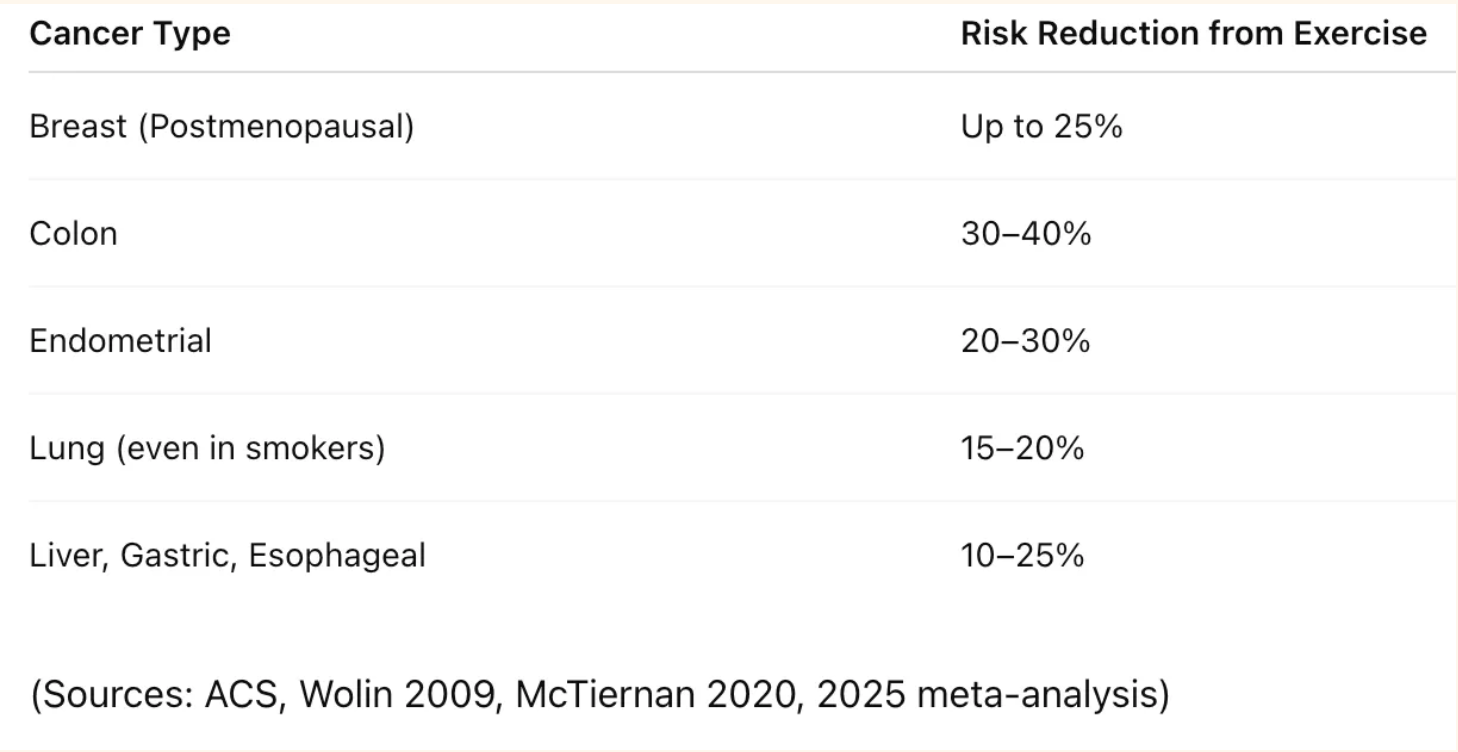
Before the Diagnosis: The Life-Saving Link Between Fitness and Cancer Prevention
Sep 12, 2025 Cancer doesn’t appear overnight. It’s the result of complex biological changes—many of which are shaped by the lives we lead each day. And among all modifiable risk factors, exercise stands out as one of the most powerful tools we have to prevent cancer before it starts, and to fight it if it does.
Cancer doesn’t appear overnight. It’s the result of complex biological changes—many of which are shaped by the lives we lead each day. And among all modifiable risk factors, exercise stands out as one of the most powerful tools we have to prevent cancer before it starts, and to fight it if it does.
With brand-new research emerging in 2025, the science is clearer than ever: movement isn't optional, it's essential.
Inactivity Is the New Smoking - And Cancer Is Taking Notice
According to the American Cancer Society, at least 18% of all cancers in the U.S. are related to physical inactivity, poor diet, and obesity [1]. But 2025 data paints an even more urgent picture:
A 2025 UK Biobank study tracking 85,000 participants found that walking just 7,000 steps/day reduced cancer risk by 11%, while 9,000 steps/day brought a 16% reduction [2].
Despite this, less than one-third of adults meet physical activity guidelines [3]. The message still isn’t landing.
How Exercise Shields You From Cancer
Here’s what’s happening under the surface when you move:
1. Hormonal Balance
Exercise lowers insulin, estrogen, and IGF-1 - hormones linked to tumor growth, especially in breast and colon cancer.
2. Anti-Inflammatory Effects
Chronic low-grade inflammation fuels cancer. Movement reduces inflammatory markers like CRP and IL-6 [4].
3. Immune Activation
Regular movement enhances immune surveillance, increasing the number and activity of natural killer (NK) cells, which destroy abnormal cells early [5].
4. DNA Protection
Recent research shows that consistent exercise promotes DNA repair and reduces oxidative stress - key in preventing cancer mutations [6].
What the New Research Shows
Here’s what’s changed in just the past year:
Structured Exercise Beats Chemo Alone
A major 2025 study of 899 stage III colon cancer patients showed that adding structured exercise to post-chemo care:
-
Reduced recurrence by 28%
-
Lowered mortality by 37%
Researchers now describe it as “more effective than many drugs” [7].
Pre-Diagnosis Activity Saves Lives
A 2024 cohort study of 28,000 patients found that just 60 minutes/week of moderate to vigorous activity before diagnosis:
-
Cut disease progression by 27%
-
Lowered death rates by 47%
Even less than 60 minutes/week provided meaningful protection [8].
Real-World Prevention via Daily Steps
Forget the 10,000-step myth - new evidence confirms that even modest movement matters. 7,000–9,000 steps/day significantly reduces risk across multiple cancers [2].
Risk Reduction by Cancer Type
What Kind of Exercise Helps?
You don’t need to train like an athlete, consistency trumps intensity.
Guidelines to Follow:
-
150–300 min/week of moderate aerobic activity
-
OR 75–150 min/week of vigorous activity
-
PLUS 2 sessions/week of strength training
Examples:
-
Brisk walking, cycling, swimming, dancing
-
Pilates, resistance bands, yoga
-
Gardening, stair-climbing, housework (it counts!)
What’s Stopping Us?
Barriers:
-
Fatigue, chronic pain, fear of injury
-
Mental health struggles
-
Lack of time, motivation, or knowledge
Solutions:
-
Start small, even 10 min/day helps
-
Work with an exercise oncology specialist
-
Use apps, step counters, or social groups for support
-
Focus on joy-based movement over perfection

Bonus: Mental Health + Resilience Boost
-
2024 studies confirm that exercise reduces depression and anxiety in cancer patients and survivors
-
Improved immune response: Exercise enhances tumor immunity and may amplify immunotherapy effects, particularly by counteracting immunosenescence.
-
Strength builds resilience: High muscle strength and cardiovascular fitness were associated with 31–46% lower all-cause mortality in advanced-stage cancer patients.
-
Mental health benefits: In older adults with cancer, exercise significantly reduced depression and anxiety while improving quality of life. And perhaps most exciting: it may even enhance immunotherapy outcomes by improving immune system function and reducing treatment toxicity [10].
The Bottom Line
If exercise were a pill, it would be the most prescribed drug in oncology. But it’s better, because it’s free, safe, and available today.
Movement isn’t just medicine. It’s a shield, a recovery tool, and a long-term survival strategy.
Let’s shift the cancer conversation from fear to prevention. From reaction to resilience. From treatment alone, to a holistic, empowered path to long-term wellness
Take Action:
✅ Go for a walk
✅ Lift something heavy
✅ Dance in your kitchen
✅ Invite someone you love to move with you
Then share this post. Because movement today could save a life tomorrow.
References
-
American Cancer Society. Cancer Facts & Figures 2025
-
UK Biobank Study. “Walking and cancer risk” - NY Post, 2025
-
CDC. Physical Activity Guidelines for Americans, 2nd edition
-
Mathur & Pedersen. Mediators of Inflammation, 2008
-
Nieman et al. Int J Sports Med, 1994
-
Exercise and DNA Repair: Nat Rev Cancer, 2024
-
Daily Telegraph. “Exercise more effective than drugs post-chemo,” June 2025
-
JAMA Oncology, 2024: Physical activity before diagnosis improves cancer survival
-
Patel et al. ACSM Guidelines for Cancer Survivors, 2024 update
-
Lancet Oncology, 2025: “Exercise supports immunotherapy success”
Start your journey to becoming an OncoVie™ Cancer Exercise Specialist with our world-leading courses in oncology exercise.


